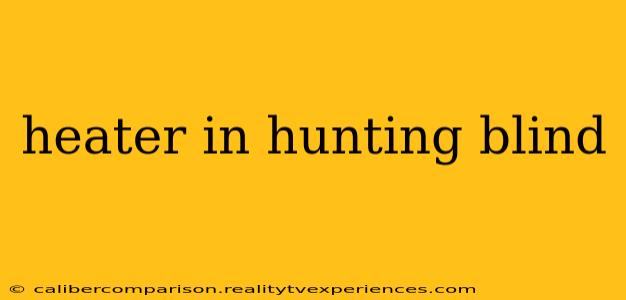Hunting season often means battling the elements, and staying warm in your hunting blind is crucial for comfort, safety, and ultimately, a successful hunt. A cold, shivering hunter isn't a focused hunter. This guide explores the best options for heating your hunting blind, considering safety, efficiency, and practicality.
Types of Hunting Blind Heaters
Several heater types offer warmth without compromising your hunting experience. Choosing the right one depends on your blind's size, power source availability, and personal preferences.
1. Propane Heaters: Powerful and Reliable
Propane heaters are a popular choice for their powerful and consistent heat output. They're ideal for larger blinds and colder climates. Look for models with:
- Oxygen depletion sensors: These safety features shut the heater off if oxygen levels become dangerously low, preventing carbon monoxide poisoning. This is crucial for enclosed spaces like hunting blinds.
- Tip-over safety switches: These automatically turn off the heater if it's accidentally knocked over, preventing fires.
- Adjustable heat settings: This allows you to fine-tune the temperature to your comfort level and conserve propane.
Pros: Powerful heat, reliable, readily available fuel. Cons: Requires propane tank storage, potential for carbon monoxide build-up (mitigated by safety features), slightly higher initial cost.
2. Electric Heaters: Convenient and Quiet
If your hunting blind has access to electricity, an electric heater offers a convenient and quiet heating solution. These are generally safer than propane heaters as they don't produce combustion byproducts. Consider:
- Ceramic heaters: These are compact, energy-efficient, and heat up quickly.
- Fan-forced heaters: These distribute heat more evenly throughout the blind.
Pros: Safe, quiet, energy-efficient (compared to propane), easy to use.
- Cons: Requires a power source, may not be powerful enough for extremely cold conditions or large blinds.
3. Catalytic Heaters: Efficient and Clean-Burning
Catalytic heaters use a catalyst to burn propane more completely, producing less carbon monoxide than traditional propane heaters. While they are generally more efficient, they often produce less heat than a comparable propane heater.
Pros: Efficient propane use, cleaner burning than traditional propane heaters. Cons: Typically less powerful than standard propane heaters.
Choosing the Right Heater for Your Needs
The best heater for your hunting blind depends on several factors:
- Blind size: Larger blinds require more powerful heaters.
- Power source availability: Do you have access to electricity or will you rely on propane?
- Budget: Propane heaters generally have a higher initial cost than electric heaters.
- Safety features: Prioritize heaters with oxygen depletion sensors and tip-over safety switches.
Safety Precautions for Using Heaters in Hunting Blinds
Always prioritize safety when using a heater in your hunting blind:
- Proper ventilation: Ensure adequate ventilation to prevent carbon monoxide buildup. Even with safety features, fresh air circulation is paramount.
- Placement: Keep the heater away from flammable materials.
- Regular maintenance: Follow the manufacturer's instructions for maintenance and cleaning.
- Carbon monoxide detector: Consider using a carbon monoxide detector inside your blind, especially when using propane heaters.
- Never leave a heater unattended: Always turn off the heater when leaving the blind.
Staying warm in your hunting blind is essential for a successful and enjoyable hunting experience. By carefully considering the different heater options and prioritizing safety, you can make your hunting trips more comfortable and productive. Remember to always consult local regulations and safety guidelines regarding the use of heating appliances in hunting blinds.

